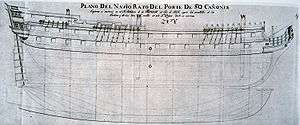Spanish ship Rayo (1751)
 | |
| History | |
|---|---|
| Name: | Rayo |
| Ordered: | 1748 |
| Builder: | Royal Dockyard, La Habana |
| Laid down: | 1748 |
| Launched: | 28 June 1749 |
| Commissioned: | 31 January 1751 |
| Fate: | Wrecked 26 October 1805; wreck burned 31 October |
| Notes: |
|
| General characteristics | |
| Class and type: | 80-gun Rayo-class ship of the line |
| Tons burthen: | 1,750 bm |
| Length: | 55 m |
| Beam: | 15,80 m |
| Draught: | 8,68 m |
| Sail plan: | Full-rigged ship |
| Complement: |
|
| Armament: |
|
The Rayo was an 80-gun ship of the line of the Spanish Navy. As was traditional for Spanish ships not named after a saint, its second, dedicatory name was San Pedro Apóstol. It fought at Trafalgar and was dismasted as a result of damage sustained in the battle. When she sortied after Trafalgar in order to recover prizes, the warship was captured by HMS Donegal. Subsequently, she ran aground and was wrecked in a storm. Her broken hull was set ablaze and destroyed by British sailors on 31 October.
Service
Early
Construction on Rayo started in 1748 in Havana, Cuba, alongside the Real Fénix and was launched in the summer of 1749. It was commissioned in January 1751, but was unable to leave port for the lack of crew. It took another year to find the enough men to sail. It left Havana for Cadiz with a minimal complement of 453, accompanied by the ships Princesa, Infante and Galicia and a cargo of sugar and timber. She remained in Cadiz for further outfits.
In 1765, under the command of Captain Don José de Rojas Recaño, Rayo was assigned to the fleet under the command of Admiral Don Juan José de Navarro Viana y Búfalo, the 1st Marqués de la Victoria. The fleet was made up of the Rayo, Arrogante, Triunfante, Atlante, Galicia, Princesa, Guerrero , Velasco, Poderoso, two chambequines and five minor vessels. The fleet sailed from Cádiz on 17 May. After briefly stopping at Cartagena, it sailed on to Genoa, arriving on 17 July to drop off the infanta Doña Luisa María Teresa de Parma, daughter of Felipe I de Parma and pick up the Princess Maria Luisa of Spain, daughter of King Carlos III. The fleet returned to Cartagena on 11 August where it dropped off the infanta Doña Luisa María Teresa de Parma and the Marques of la Victoria, Juan José de Navarro Viana y Búfalo. Command was then handed over to Admiral Don Luis de Córdova y Córdova. A smaller fleet was formed, sailing from Cartagena on 23 August, consisting of the Rayo, Princesa and Guerrero which was tasked with escorting two tartans and a saetía back to Cádiz.[1]
In 1769, Rayo was disarmed and stationed at Cádiz under the command of Captain Don Pedro Moyano who was charged with the ship's preservation. Between February and April 1769, the ship was careened and refitted [1]
Trafalgar
Rayo was dismasted as a result of damage sustained in the battle. A few days later, Rayo went to sea in an attempt to recapture prizes taken by the British. During this effort, it was captured by HMS Donegal. With a British prize crew aboard, she ran aground in the storm of 26 October and was wrecked. Her broken hull was set ablaze and destroyed by British sailors on 31 October.